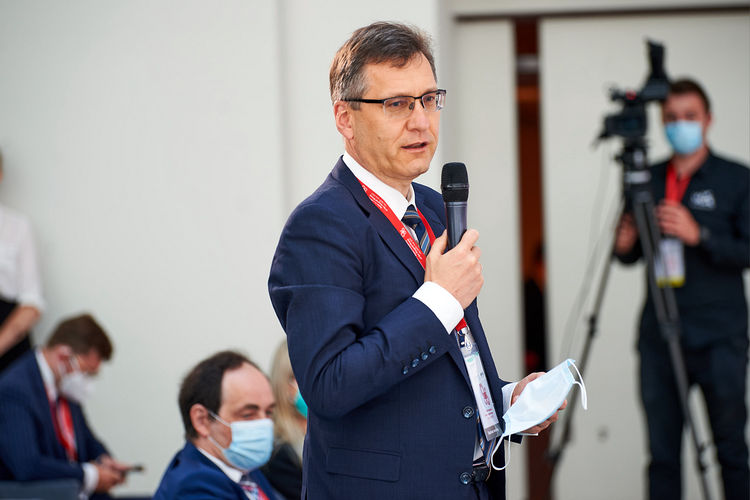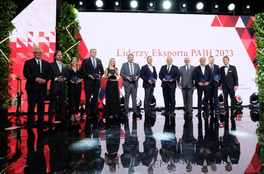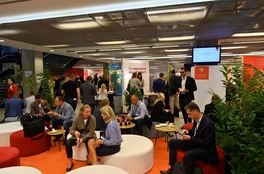The Ministers of the V4 Group and France debated in Krakow on the challenges facing the pharmaceutical and biotechnology sectors
The debate was attended by the following ministers for the economy: Bruno Le Maire from France, Karel Havliček from the Czech Republic, Richard Sulik from Slovakia and László Palkovics from Hungary. The Polish side was represented by Jarosław Gowin, Deputy Prime Minister and Minister of Development, Labour and Technology, and Krzysztof Drynda, Chairman of the Polish Investment and Trade Agency, as well as representatives of the business world. The discussion during the event, focused on the challenges facing the pharmaceutical and biotechnology sectors resulting from the COVID-19 pandemic.
Finding drugs and a vaccine for COVID-19 and improving patients' access to drugs are currently key issues for the world of science and countries around the world. For over a year, the protection of human life and health has been the most important value, and the pharmaceutical industrial and its technological potential has become a very important element of the international competitiveness of the European Union’s economy.
As part of the National Plan for Reconstruction and Increasing resilience (KPO), Poland plans to provide support in the development of research and development activities in the field of active pharmaceutical substances and drugs and support in the area of building production infrastructure. The reforms included in the KPO should have a long-term positive impact on the biotechnology, green (climate-neutral and circular) and digital transformation industries, said Jarosław Gowin, Deputy Prime Minister and Minister of Development, Labour and Technology.
KPO is also important for the recovery of the Polish economy after the pandemic. In order to emphasize the role of the pharmaceutical sector in building an innovative economy and improving access to safe and effective drugs, a joint declaration of the Visegrad Group and France on mutual cooperation in the development of the pharmaceutical industry was signed at the meeting in Krakow.
The experience of last year, has shown that basing Europe's drug safety on global supply chains is dangerous and can lead to significant drug shortages. The main reason for these shortages is the concentration of production of active pharmaceutical substances (APIs) for the global pharmaceutical industry in China and India. Thus, the discussion on the resilience of the value chain in this area and the return to the condition after the crisis has acquired a new, urgent character - said Krzysztof Drynda, President of the Polish Investment and Trade Agency.
- The main export direction for Polish producers are the countries of the European Union. The largest recipient is Germany, which in 2019 received 28.4% of Polish exports of the pharmaceutical industry - emphasized President Drynda.
The participants of the meeting agreed that the EU’s current policy must be reviewed in terms of issues related to the security of supplies of raw material. In particular, tools and measures for monitoring shortages or stockpiling for producers and traders dealing with critical products, and securing and ensuring EU minimum production capacity for these products, including do this through targeted reshoring.
The pharmaceutical industry in Poland
The pharmaceutical sector in Poland is an innovation leader. More than 2/3 (66.7%) of all companies involved in the production of pharmaceutical products are innovative entities. The production of drugs and pharmaceutical products in Poland contributes to the generation of over PLN 15 billion, i.e. about 1% of GDP.
One hundred thousand jobs are directly or indirectly related to the domestic pharmaceutical industry.
The pharmaceutical industry’s exports from Poland, in 2015–2019 increased by 23.9%, from EUR 2.8 billion to EUR 3.5 billion. Medicines consisting of mixed or nonmixed products for therapeutic or prophylactic purposes "including those in the form of transdermal administration" or in forms or packaging for retail sale, have the largest share, that is71.6% in Polish exports of pharmaceuticals. The main export direction for Polish producers are countries in the European Union. The largest recipient is Germany, which in 2019 received 28.4% of these exports. The next three recipients are Russia, the Czech Republic and Great Britain, which purchased a total of 22.4% of the products exported by Poland. The top 10 countries that import Polish pharmaceutical products account for nearly 69.6% of these exports.
The value of Polish imports of basic pharmaceutical substances, drugs and other pharmaceutical products in 2019 amounted to EUR 7.1 billion (3% of Polish imports ), 1/3 of which were active substances and intermediates. The most important suppliers were: Germany, Belgium, France, Italy, Switzerland, Ireland and China. The share of the latter in the Polish import of products of section 21 of “PKWiU” (the Polish classification of products and services) amounted to 4.6%. More than half of these imports were active substances and intermediates. Among the most important imported active substances used in the production of drugs in Poland, China is a key supplier of many of them. In 2019, for example, more than 30 percent of the import of sulfonamides (a component of antibacterial drugs), 36 percent of lysine and its salts (an organic chemical compound from the group of protein amino acids, a building block of proteins), 62 percent of vitamin C and its derivatives, 71 percent of heparin and its salts, 97 percent of routines and 96 percent of Tetracyclines.
The biotechnology industry in Poland
In 2019, 182 companies, known as biotechnology companies (BF), were active in the field of biotechnology. Among them, 53.3% were companies defined as specializing in biotechnological activities (DBF). Research and development (R&D) in the field of biotechnology (BRDF) comprised 63.7% of the total number of biotechnology companies, of which nearly 60% conducted only R&D in this field. The remaining companies (BRDF) combined R&D activities with biotechnological production.
In 2019, the internal expenditure of companies, on activity in the field of biotechnology amounted to PLN 1,187.3 million, of which 80.7% were their own funds.
In Poland in 2019, R&D in the field of biotechnology was carried out by 231 entities, of which slightly more than half were entities from the enterprise sector. The most numerous group in terms of the areas of biotechnology application were entities dealing with the protection of human health - 56.7% of the total number of entities conducting biotechnological R&D activity. Internal expenditure on R&D in the field of biotechnology in 2019 increased annually by 6.5%, reaching the value of PLN 976.8 million. Internal expenditure of entities included in the enterprise sector accounted for 47.8% of this amount, the higher education sector - 51.7%, while the government sector together with the sector of private non-profit institutions - 0.5%. In 2019, 7,727 people were involved in R&D in the field of biotechnology. The number of people employed decreased by 4.5% compared to the previous year. Almost 3/4 of the personnel involved in R&D in the field of biotechnology were those carrying out scientific and research work.
The highest expenditure on R&D in the field of biotechnology was characteristic of the higher education sector, which spent over half a billion PLN on scientific research and development works in the field of biotechnology, which constituted 51.7% of internal expenditure on R&D in the field of biotechnology. the field of biotechnology. In the case of the enterprise and government sectors, together with the private non-profit institutions sector, this share amounted to 47.8% and 0.5%, respectively.
Among Polish biotechnology companies that are successful on the European and international arena, the following should be mentioned: Mabion, OncoArendi Therapeutics, Genomtec.
About the Polish Investment and Trade Agency
The Polish Investment and Trade Agency (PAIH) is an advisory institution operating in cooperation with the Polish Development Fund Group (PFR) under the leadership of the Ministry of Development, Labor and Technology. PAIH is the first point of contact for exporters and investors. It operates both in Poland and through a network of offices around the world. It works to strengthen the recognition of Polish brands on international markets, promotes domestic products and services as well as technological solutions made in Poland. The agency helps entrepreneurs choose their optimal expansion path abroad. It also supports the inflow of direct foreign investments to Poland and the implementation of Polish investments in the country. PAIH cooperates with the public sector and regional partners, offering, among other things: training, audit and promotion of investment properties, cooperation in the organization of business missions and communication support in the implementation of joint projects.
V4+France Business Meeting:
Photo gallery:








































